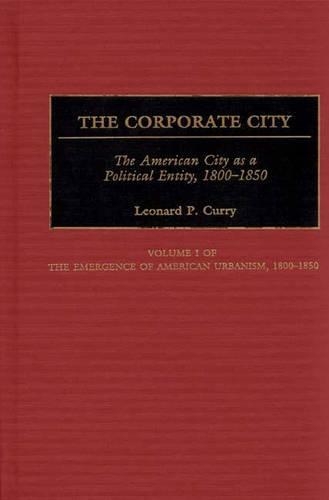
The Corporate City: The American City as a Political Entity, 1800-1850
(Hardback)
Publishing Details
The Corporate City: The American City as a Political Entity, 1800-1850
By (Author) Leonard P. Curry
Bloomsbury Publishing PLC
Praeger Publishers Inc
21st May 1997
United States
Classifications
Tertiary Education
Non Fiction
Regional, state and other local government
History of the Americas
320.850973
Physical Properties
Hardback
392
Description
This book begins the comparative study of U.S. urban development during the first half of the 19th century. Breathtaking in its comprehensiveness, its survey and comparisons of early urban politics is without parallel. The study is based on a thorough examination of fifteen citiesAlbany, Baltimore, Boston, Brooklyn, Buffalo, Charleston, Cincinnati, Louisville, New Orleans, New York, Philadelphia, Pittsburgh, Providence, St. Louis, and Washington. This group of citiesthe fifteen largest in 1850provides a good mix of northern and southern, eastern and western, old and new, and fast- and slow-growing urban centers. This volume deals with the city as a corporate entity and contains chapters on urban governmental structures, government finance, politics and elections, urban political leadership, the city plan and city planning, intergovernmental relations, and urban mercantilism.
Reviews
Curry...ably documents the contribution of the early-19th-century city to the development of a private mercantile economy. Those interested in formal government structures and city planning, party governing coalitions, corporate regimes and community power studies, intergovenmental relations, urban finance, and the roots of a growth machine based in transportation technology will welcome this data set of the 15 most populous cities as of 1800.... fascinating, stimulating...-Choice
The thoroughness of the research is aptly illustrated by the many financial tables and city maps found throughout he Corporate City.-Journal of Southern History
"The thoroughness of the research is aptly illustrated by the many financial tables and city maps found throughout he Corporate City."-Journal of Southern History
"Curry...ably documents the contribution of the early-19th-century city to the development of a private mercantile economy. Those interested in formal government structures and city planning, party governing coalitions, corporate regimes and community power studies, intergovenmental relations, urban finance, and the roots of a growth machine based in transportation technology will welcome this data set of the 15 most populous cities as of 1800.... fascinating, stimulating..."-Choice
Author Bio
LEONARD P. CURRY is Professor of History at the University of Louisville. His book, The Free Black in Urban America, 1800-1850: The Shadow of the Dream (1981), was nominated for the Pulitzer Prize in History at the request of the chair of the history panel.
